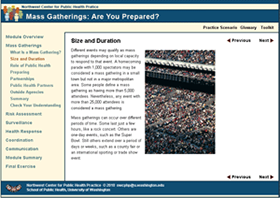Description
Food poisoning at the fair, rabies exposure at the rodeo, crowd trampling at a World Cup game: what is the role of public health at events that attract large crowds? This online course teaches you to assess and plan for the prevention and mitigation of public health threats at mass gatherings. It covers topics of risk assessment, surveillance, health response, coordination, and communication. This 90-minute online course can be completed over several shorter sessions. It also includes a unique practice scenario to further enhance your learning.
Learning Objectives
- Define three characteristics of mass gatherings
- List four major areas of public health responsibility related to mass gatherings
- Identify tools and resources to assist in the planning of key public health activities at mass gatherings
- Identify four key factors that influence potential health risks associated with mass gatherings
- Describe the importance of involving public health in the coordination and communication with other agencies and organizations throughout the planning and operational processes for mass gatherings
Intended Audience
Public health and emergency management professionals with a basic understanding of surveillance and outbreak investigation
Format
This online course has interactive exercises (Flash-based) and should take approximately 90 minutes to complete.
Course Instructor
Andy Stergachis, PhD, RPh
Professor, Epidemiology and Global Health, Adjunct Professor, Pharmacy
Northwest Center for Public Health Practice, School of Public Health, University of Washington
Director, WHO Collaborating Centre on Mass Gatherings Public Health at the University of Washington
Technical Requirements
This course requires certain software and browser plugins to be installed. See our Technical Requirements page for details.
Accessibility
This online training course is text-based and is designed for accessibility. A print version of the course is also available. Please note that the print version does not include interactive exercises, quizzes, or the final assessment. Flash-based interactive exercises and quizzes in the course may not be accessible to screen readers. To receive a print version of the quizzes, please contact nwcphp@u.washington.edu. If you have any difficulties in accessing the information given in any of our documents or need further assistance, please contact nwcphp@u.washington.edu.
